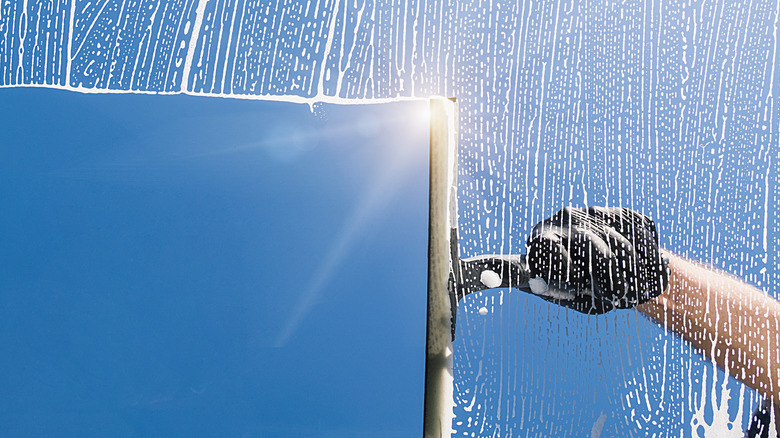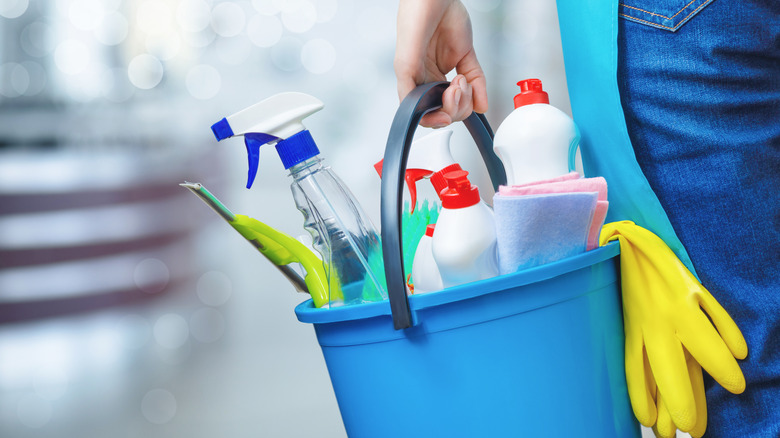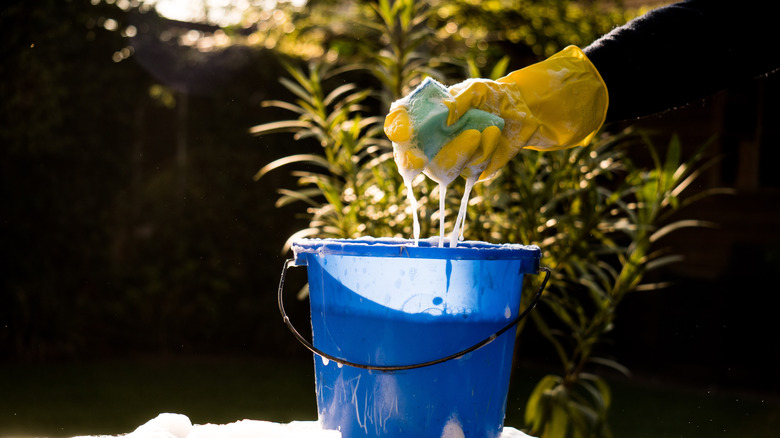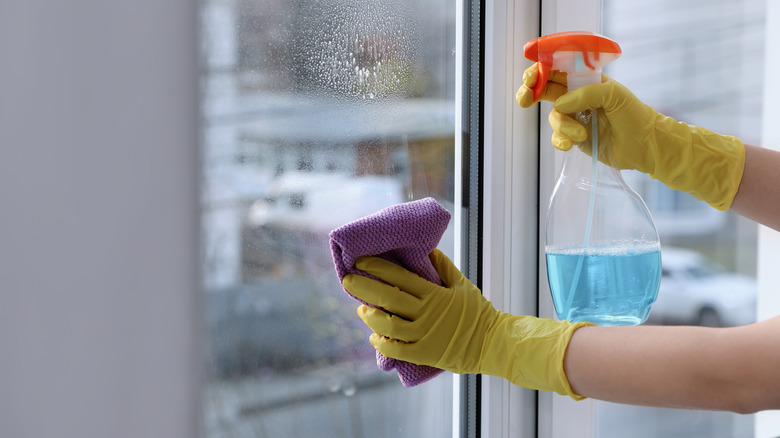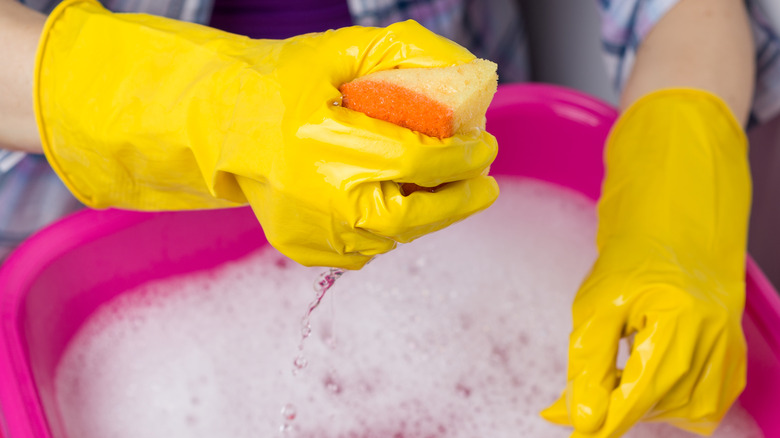The Biggest Mistakes You're Making When Cleaning Windows
Many people don't clean their windows as part of their regular weekly cleaning routine — after all, most houses or apartments have quite a few windows, and the whole process can be incredibly time-consuming. You might need to get cleaning solutions or equipment that you don't typically use, and if you're cleaning the exterior as well, you might even need to wait for certain times of the year, depending on the climate you live in. Plus, dirt and dust don't accumulate on windows quite as quickly as they gather on heavily-use surfaces like your kitchen countertops and bathroom, so you might guess whether the job even needs to be done more than once in a while.
However, your windows are still an area of your home that needs addressing, and you should certainly incorporate window washing during deep cleans of your space. According to Family Handyman, you shouldn't wait until you do your annual spring clean — you should clean the interior and exterior of your windows about once every six months. And if you're going to clean them, you may as well do it right! If you want sparkling windows straight out of a magazine spread, you'll want to be mindful of a few things that many people get wrong. To that end, here are some of the biggest mistakes you're making when cleaning windows, and what you can do to improve the process.
Washing your windows on sunny days
It may seem like a hot, sunny day is the perfect day to clean your windows — after all, the natural sunlight streaming in means you'll spot every little particle of dirt and streak, right? Plus, with all that heat shining down on your windows, they'll probably dry off much faster, which will just streamline the process for you. Well, a word of caution before you gather all your cleaning supplies: A sunny day is actually the worst possible time to clean your windows, according to Realtor. And, it's precisely because of how that shining sun interacts with all your cleaning products.
Namely, the sun streaming in through all your windows actually dries the liquid you're using to clean the windows a bit too quickly, before you really have a chance to thoroughly remove all the dirt and grime and clean away any streaks. As a result, you won't get the same sparkling clean you would on other days — you may find that even the most skilled cleaner leaves behind a bit of a film on the glass, or a few streaks, when trying to clean on a sunny day. If you live in an area where the cloudy days are limited, consider doing your window cleaning either in the late afternoon or in the early morning when the sun is a bit more mild, as Seattle Window Washers recommends.
Not cleaning off dirt and dust first
This step will obviously depend on the state of your windows — if you regularly clean them and are really just making sure they truly sparkle, you might be able to skip this step. However, if your windows are looking particularly dirty, or if you haven't cleaned them in a while, you'll want to ensure you clean off some of the dust and dirt particles first, before you actually start the real cleaning with your solution of choice, as Realtor recommends.
Especially with dust, once it gets damp, you'll just be pushing it around the window. And with dirt or larger particles, you could potentially scratch your windows, or even just make them messier by spreading the residue over your window, if you don't clean off some of the major mess as a preliminary step. Before you lather up and get every square inch of your window sparkling clean, give your dirty window a once-over to remove any visible grime. It'll make the cleaning process a whole lot easier, and according to Golden Maid Services, may even help prevent streaking.
Not investing in the right tools
You may have seen the elegant, smooth movements of professional window washers as they squeegee the surface of an exterior window during a commercial building clean. There's a reason for all the items they use: They select the tools that will help them get the job done best. You may not have a full scaffolding set-up to clean every single one of your windows, but taking the time to select the right tools will help you avoid some major window washing mistakes.
For the cleaning process, you'll likely need a sponge of some sorts, as well as a squeegee to swipe away all that water. And for drying, as Fantastic Services suggests, you'll want to avoid using things like paper towels, as they can leave residue on your windows. Some swear by newspaper, but as Clean and Clear explains, that can actually leave ink residue or potentially stain the frame around your windows — not an ideal choice. Instead, invest in some soft microfiber cloths — they'll ensure your windows are sparkling clean, and are a versatile cleaning tool that can be used elsewhere in your home as well. An extra tip? Don't toss the microfiber cloths in the wash with fabric softener — it can cause them to shed tiny textile fibers on your window, which can ruin your otherwise flawless cleaning job.
Using hard water
You may have heard of hard water and soft water before in passing, and known that showering in hard water can potentially impact your hair or skin, as Real Simple explains. However, did you know that hard water can also have a damaging effect on your windows? When looking at a bucket of sudsy water, you may not be able to tell whether you're using hard or soft water, but you'll definitely be able to spot the difference when the cleaning has actually been completed.
As Renewal by Andersen Window Replacement states, over time, you might see mineral deposits that linger on your windows as a result of using hard water to clean. Sure, you may not spot them immediately after washing your windows, but over time with regular window washing, that layer of mineral deposits will prevent your windows from remaining as sparkling clean as you likely want them to be.
Luckily, there's an easy fix for this mistake — just ensure you're not using hard water for this particular chore! You may consider installing a water softener, or for an even easier solution, just use distilled water for cleaning. It's not quite as easy as just grabbing a bucket from the tap, but you won't have those pesky mineral deposits to deal with.
Using the wrong cleaning solution (or wrong concentration)
The process of cleaning your windows may seem easy, but it'll only be as effective as your cleaning solution — and it's a bit of a delicate balance. As Clean and Clear says, you don't want to make the mistake of using too little of your cleaner to get the job done. Yes, you can do a lot with a little elbow grease when it comes to making your windows really shine, but starting with enough cleaning solution is key.
However, as Seattle Window Washers explains, you also don't want to make the mistake of just tossing the most intense, concentrated cleaning solutions onto your window in the hopes that the powerful products will make the cleaning process effortless; these type of harsh cleaners can actually potentially damage the glass surface of our windows or even cause more dust to form. Additionally, depending on the windows you're cleaning and what's surrounding them, some more concentrated, chemical-based cleaning products could potentially damage your window frame, as Fantastic Services explains.
In summary, you'll want to find a cleaning solution that is appropriate for windows, and use enough of it to really get the job done.
Not swapping out your cleaning liquid enough
If you're simply using the same bucket of sudsy water to clean every window in your home, we've got some news for you: You're probably not getting the level of clean that you want, as you're just wiping down windows with slightly dirty water, even if it's filled with bubbles and looks squeaky clean at first glance. As Clean Conscience says, when you're using the same cloths or rags to clean multiple surfaces, you're essentially putting more dirt onto your widows instead of removing it.
Now, we're not saying you have to use a fresh bucket of water for every single window — that would be insanely time-consuming and wasteful. However, especially if you're dealing with particularly dirty windows, you do want to swap out your cleaning solution throughout so that you know you're not just undoing all your hard work by cleaning your windows with murky water. A good rule of thumb from Today is to get fresh materials, whether that's a clean rag or cloth or a new bucket of water, when you start to see residue being left behind on the windows you're trying to clean.

